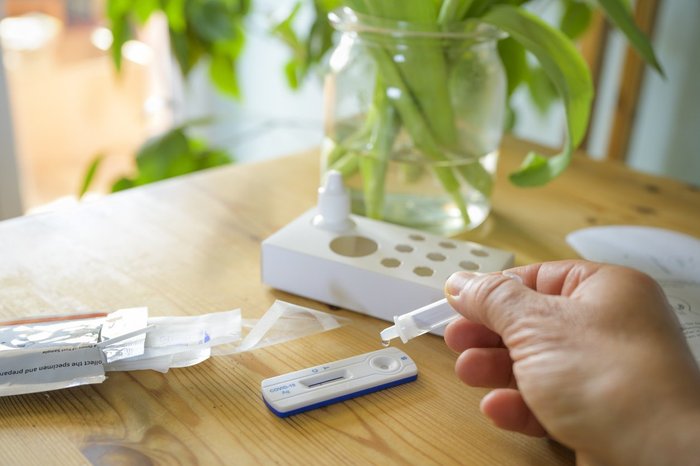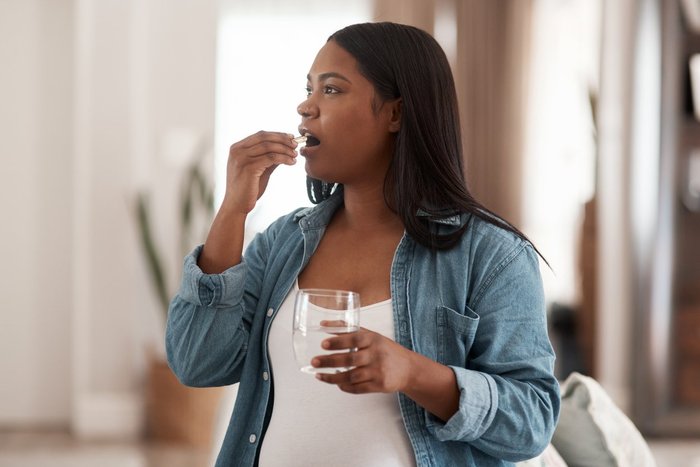If you have Covid-19 symptoms and are eligible for Covid-19 treatments, take a lateral flow test (LFT) as soon as possible to ensure prompt access to an assessment for treatment.
How do I access Covid-19 treatments across the UK?
Depending on where you live in the UK, how you access treatments will differ. Please refer to the appropriate section below for advice as to how to access antiviral treatments should you test positive for Covid-19 and are eligible.
It is important that you carefully describe all of your Covid-19 symptoms during any assessments. You should also have a list of all medications you are currently taking (prescribed by a doctor and any medications bought from a pharmacy or shop without prescription). This is for safety reasons as some medicines can cause serious side effects when taken together. The NHS will assess you and advise which treatment, if any, is suitable for you.
Accessing treatment in the nations of the UK
If you have Covid-19 symptoms, you should take a lateral flow test as soon as possible. If you test positive, you’ll need to report your positive test online or by calling 119.
You should then notify your Health Board about your positive Covid-19 result. You can find contact numbers for each Health Board here.
Tell the person you speak to that you are immunosuppressed, that you have a positive Covid-19 test, and that you think you are eligible for treatment. You can also get advice by calling 111, your hospital team or your GP.
If you have Covid-19 symptoms, you should take a lateral flow test as soon as possible. If it’s positive, you will need to fill out the self-referral form Covid-19 Antiviral Self-Referral Form (NHS 111 Wales). If you cannot access the self referral portal you can ask your GP to refer you for assessment or you can call NHS 111 and state or by calling 119. You should then receive an automatic phone call from your local Health Board within 24 hours to ask about your symptoms and discuss treatment.
Tell the person you speak to that you are immunosuppressed and that you think you are eligible for the Covid-19 treatment.
If you have Covid-19 symptoms, you should take a lateral flow test as soon as possible. If it’s positive, you’ll need to record your positive test online or by calling 119. You should then receive an automatic phone call from the NHS within 24 hours to ask about your symptoms and discuss the treatment.
We advise that as soon as you know you have a positive lateral flow test result, you contact 111 or your local Trust to ask about getting the telephone assessment for treatment. You could also call your hospital team or your GP for advice.
Whoever you speak to, tell them you are immunosuppressed, that you have a positive Covid-19 test result, and that you think you are eligible for treatment.
Accessing treatment in England
Covid-19 treatments in England are now arranged as part of routine NHS services.
In most areas, the advice is to contact your GP, NHS111 or your hospital team if you test positive for Covid-19, and they will be able to directly refer you to the Covid Medicines Delivery Unit (CMDU) for your area.
However, the advice is different if you live in one of the areas below, where in some cases you can directly refer yourself for assessment for treatment.
| Integrated Care Board in England | How to access Covid-19 treatment |
|---|---|
Black Country |
You can contact the Community Covid Treatment Service on 07775 752740 (Monday-Friday) or by emailing [email protected] (email if you test positive outside of office hours). Read about the Covid-19 treatments available in the Black Country. |
Cheshire and Merseyside |
You can self-refer by phoning 0151 296 7222 or by emailing [email protected]. |
Derby and Derbyshire |
You can self-refer by ringing 0300 1000 432 or emailing [email protected]. Alternatively, please contact your GP or NHS 111 to be referred to the CMDU team. |
Devon |
If you are under a hospital team, call them first and they will be able to refer you to the CMDU. If you are not under a hospital team, call your GP or NHS111. |
Frimley |
You can call the CMDU directly for assessment on 0300 024 0000 (lines are open 24/7). |
Hampshire and the Isle of Wight |
You can complete this webform to refer yourself for treatment or call 0330 058 7080. |
Humber and North Yorkshire |
You can complete this webform to refer yourself for treatment. If you are unable to complete the form, please call your GP or NHS111. |
Kent and Medway |
You can self-refer to the CMDU by emailing [email protected]. If you cannot email, please contact your GP or NHS 111 to be referred to the CMDU team. |
Leicester, Leicestershire and Rutland |
You can contact the Covid Medicines Service on 0116 497 5700 or by emailing [email protected]. Read about the treatments in the Leicester, Leicestershire and Rutland area. |
North Central London |
North Central London You can contact the Covid Medicines Service directly by phone on 020 3838 7121 (10am-1pm Monday-Friday and 10am-12noon Saturday and Sunday) or by emailing [email protected] (mailbox monitored 9am-5pm Monday-Friday and 9am-2pm Saturday and Sunday). An answering machine is available outside of operating hours and calls will be returned. |
North East London |
You can contact the CMDU directly by phone on 020 3838 7121 or email at [email protected]. You do not need to wait for referral, you can refer yourself to this service. |
South East London |
You can refer yourself directly to the CDMU by calling 010 7188 0510 (Monday-Saturday 8.30am-5.30pm and Sunday 8.30am-3.30pm). |
South West London |
You can contact the CMDU directly by calling 020 8725 1559 (Monday-Friday 9am-5pm), or by emailing [email protected]. |
Nottingham and Nottinghamshire |
You can contact the CMDU on 01158 462 392 (8am-4pm) to self-refer. Read about the treatments in the Nottingham and Nottinghamshire area. |
Somerset |
Contact NHS 111 who will refer you to the Covid-19 Medicines Service for assessment for treatment. |
Suffolk and North East Essex |
You can call the Suffolk and North East Essex CMDU on 01473 299612 to be assessed for treatment. Read about the treatment in the Suffolk and North East Essex area. |
Surrey Heartlands |
You can call the CMDU for assessment on 0300 024 0000 (lines are open 24/7). |
South Yorkshire |
Contact your GP or NHS 111 who will refer you for assessment for treatment. If you are under 16 your paediatric specialist should be contacted to make a referral to Sheffield Children's Hospital. Find out more about Covid-19 treatments in South Yorkshire. |
West Yorkshire |
Contact NHS 111 who will refer you to a screening process for treatments. |
How do I get a Covid-19 test?
Both government issued tests and tests bought privately can be used to access assessment for Covid-19 treatments.
Anyone eligible for Covid-19 treatments should ensure they have at least three tests available at home at all times so they can test for three consecutive days once symptoms appear. People should only use these tests when they have symptoms.
Free tests are no longer available for the general population. People who are eligible for Covid-19 treatments can access free lateral flow tests (LFTs) in the following ways:
Scotland - order free lateral flow tests online
Wales – free LFTs can be collected from participating pharmacies and you can find pharmacies offering free LFTs on the NHS Wales website.
England – free LFTs can be collected from participating community pharmacies.
Northern Ireland - free LFTs can be collected from participating community pharmacies.
When picking up lateral flow tests, the pharmacy may ask you questions about your medical history to confirm you’re eligible for free tests. If you have a copy of a letter or email sent to you by the NHS that says you’re eligible for Covid-19 treatments, please bring this with you. A letter or email is not essential, but it will help to more easily and quickly confirm your eligibility.
Anyone collecting free tests on your behalf should provide the pharmacy with your details and any relevant letters or e-mails about Covid-19 treatments, if you have them. The required details include:
- the medical condition(s) confirming the patient’s eligibility
- the patient’s NHS number (if available)
- the patient’s full name
- the patient’s date of birth
- the patient’s address.
How to look after myself if I test positive for Covid-19?
You need to inform your kidney doctor by telephone if you test positive, so they can help you to manage the illness.
Anyone who tests positive for Covid-19 should not go into their renal unit or to dialysis until they have spoken to them, and should not visit their GP, pharmacy or hospital in person.
Follow NHS advice if you are managing your symptoms at home. If you live alone, ask a family member, friend or neighbour to check up on you via a telephone call, or at the doorway. If you start to feel worse or more breathless, call your GP or kidney doctor.
Dial 999 in an emergency if you are seriously ill.
Do not change your medications unless advised to do so by your kidney unit.
You may be asked by your clinician to monitor your oxygen levels using a pulse oximeter device.
If you test positive for Covid-19, you are no longer legally required to self-isolate, but you should follow government advice for your country to try to stop the spread of the virus.
Financial support may be available in Northern Ireland for people who are losing earnings because they are self-isolating or caring for someone who has tested positive. It is no longer available in England, Scotland or Wales.
Someone in my household has tested positive for Covid-19. What should I do?
If someone in your household has symptoms or has tested positive for Covid-19, you should try to avoid being in close contact with them if you can. You should also maintain careful hygiene, in order to reduce the risk of spreading the virus.

Who can access Covid-19 treatments at home?
People at the highest risk from Covid-19 are entitled to fast access to an assessment for Covid-19 treatments if they test positive for the virus. This group includes people with kidney transplants, those on dialysis and anyone with stage 4 or 5 chronic kidney disease (CKD).
The National Institute for Health and Care Excellence publishes guidance on treatments for Covid-19 and which treatments should be considered for people with different health conditions.
What Covid-19 treatments might I be offered?
Once you have been assessed, your clinician may recommend an antiviral treatment (e.g. molnupiravir) to be taken orally. Alternatively, you may have to travel to a day clinic at a hospital to receive a monoclonal antibody treatment (e.g. sotrovimab). Monoclonal antibody treatments are normally given by intravenous infusion into your vein. You will be given instructions on where to get the treatment and how to get there and back safely.
NICE recommends that the following are treatment options for Covid-19 for people in the community:
- Paxlovid (also called nirmatrelvir plus ritonavir) – recommended for adults who do not need supplementary oxygen
- Xevudy (also called sotrovimab) – recommended for people aged 12 and over, weighing at least 40kg, if they do not need supplementary oxygen and Paxlovid is unsuitable.
Paxlovid is not suitable for some people with kidney problems and people who take certain medicines, including medicines commonly taken if you have a kidney transplant (including tacrolimus, cyclosporin and sirolimus). Tell your doctor, or the clinician assessing you for treatment, that you have kidney disease and tell them what medicines you are taking.
